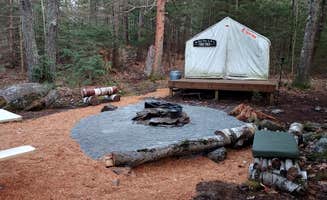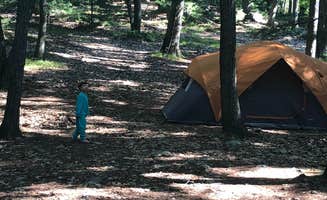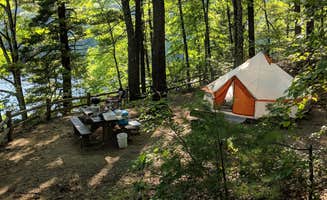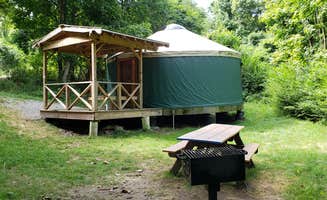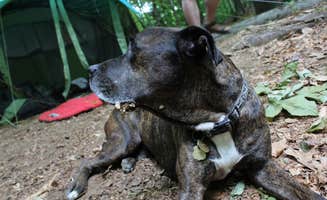Tent camping near Lunenburg, Massachusetts offers rustic outdoor experiences typically away from developed urban areas. Campsites in this region of north-central Massachusetts sit at elevations ranging from 400-1000 feet, creating varied terrain for hiking and exploration. Fall temperatures drop into the 30s-40s°F at night, requiring proper cold weather gear for camping beyond summer months.
What to do
Paddling adventures: At Tully Lake Recreation Area, campers can rent canoes, kayaks and paddleboards to explore the lake. "We take our canoe and spend the whole day at the lake. You can find lots of private areas to swim, pick blueberries and relax," reports one visitor.
Hiking trails: Many campgrounds connect to trail networks. "From the main entrance, collect a cart, load your gear, and following the appropriate divergent path from the parking lot or bath house (they are color coded)," notes a camper about the pathways at Tully Lake. Near the dam, hikers can access a 4-mile loop trail around the lake with Doane's Falls as the highlight.
Swimming options: Without designated swimming areas at many campgrounds, waterfront tent sites become valuable. At Barton Cove Campground, "You can't swim (unless you rent a canoe/kayak and swim while you're out on the water) and sites are fenced in due to how steep it is to the water which was a downside but views between the trees are nice."
What campers like
Privacy between sites: Many tent campers appreciate the separation between campsites. At Federated Womens Club State Forest, sites are walk-in with "a narrow trail leading from the road." This arrangement creates natural buffers between camping parties.
Cart systems: While initially seeming inconvenient, the cart systems at walk-in campgrounds receive positive feedback. "More rustic and you can't drive your vehicle to the site. They have carts to haul your stuff. Everything is clean and well maintained, and the staff was helpful and friendly," notes a Tully Lake camper.
Family-friendly activities: One visitor at Camp Nihan Education Center notes it provides "the perfect blend of rugged and convenient for small kid camping" with "terrain rugged enough that it always felt like we were really in the woods" while maintaining convenient amenities.
What you should know
Advance planning required: Reservations for popular campgrounds fill quickly. "The sites fill up weeks out (and can completely fill the day registration opens, which is date-dependent each year...Booking for Memorial Day meant I booked in April), so you have to be on your game," advises a Tully Lake visitor.
Limited cell service: Most campgrounds in the region have minimal connectivity. At Federated Womens Club State Forest, "Cell phone coverage is faint to nonexistent on Verizon. You may want to download offline maps before you head out here."
Site selection matters: Each campground offers varying site configurations. "The office was super helpful when I called to make reservations, making sure to ask questions about how big my tent was, what kind of view/privacy we wanted etc so they could help me find the perfect campsite," reports a Barton Cove camper.
Tips for camping with families
Choose accessible sites: With young children, consider campsite location carefully. At Tully Lake, one family noted their "site was fairly far from services, long run with small kids in the middle of the night. Not our favorite place, but to be fair mostly based on our site and neighboring campers."
Site security: Families appreciate campgrounds where vehicle traffic is restricted. At Boston Harbor Islands State Park Campground, "No cars at all at the campsites, which was great for peace of mind as our toddler roamed around. It also made for a super quiet stay."
Shallow swimming areas: When camping with children, look for safe water access. Some campgrounds connect to swimming areas with lifeguards, such as at Camp Nihan Education Center which is "adjacent to Breakheart Reservation, which had a great shallow pond with life guard on duty as well as bike trails and a range of different hikes."
Tips from RVers
Site logistics: While tent camping dominates in this region, campers with small trailers should note access limitations. Most tent sites require parking in designated lots and using carts to transport gear. At Tully Lake, sites range from 50 yards to nearly a mile from parking areas.
Facilities access: When considering a campground, assess bathroom proximity. At Tully Lake, "the bathrooms are located near the entrance to the Park, and include flush toilets as well as coin operated, hot showers, open 24/7. There are sinks beside the building, where campers are asked to wash their dishes, rather than at the camp site."


